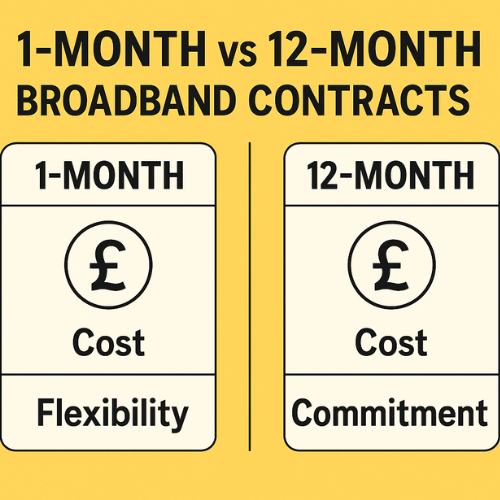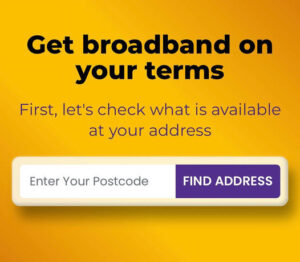1-Month vs 12-Month Broadband Contracts: What’s the Real Cost

When choosing an internet plan, one of the key decisions you’ll face is whether to opt for a short-term or long-term contract. The most common options available today are 1-month and 12-month broadband contracts. But which one offers the better deal? This article aims to break down the costs, benefits, and potential pitfalls of each option, helping you make an informed decision that suits your needs.
Choosing the right broadband contract is not just about the monthly fee—it’s about understanding your personal and professional needs, your financial situation, and the level of commitment you’re ready to make. With the rapid evolution of the digital landscape, both short-term and long-term broadband contracts offer unique advantages and challenges that can significantly impact your internet experience.
Understanding Broadband Contracts
Before diving into the comparison, it’s important to understand what broadband contracts entail. Typically, they outline the terms under which you receive internet services from a provider. This includes the duration of the contract, monthly costs, data limits, and any additional fees or charges. Understanding these components is crucial when comparing different internet plans.
Broadband contracts are essentially binding agreements between the service provider and the customer, detailing what each party can expect from the arrangement. Contracts may also specify the type of technology used, such as fiber optic, DSL, or satellite, which can affect speed and reliability. Additionally, contracts often outline customer service protocols and the process for handling technical issues, which can be critical factors in maintaining a smooth internet experience.
Types of Broadband Contracts
Broadly, broadband contracts can be divided into two categories: short-term (1-month) and long-term (12-month or more). Both have their own set of advantages and disadvantages.
- 1-Month Contracts: Also known as no-contract or pay-as-you-go plans, these offer flexibility with minimal commitment. They are ideal for those who may need internet service for a short period or wish to avoid long-term commitments. The ability to switch providers easily without hefty penalties is a significant advantage for consumers who prioritize adaptability and freedom in their internet choices.
- 12-Month Contracts: These are traditional contracts that typically offer lower monthly rates in exchange for a longer commitment. They are suitable for individuals or families planning to stay in one location for an extended period. Such contracts often come with perks such as bundled services or promotional discounts, making them attractive for those planning to settle down in a stable environment.
Cost Analysis
A major factor in deciding between 1-month and 12-month broadband contracts is cost. Here’s a breakdown of how these contracts typically compare in terms of expenses.
Understanding the financial implications of each type of contract can significantly impact your decision-making process. It’s important to consider not only the monthly fees but also the ancillary costs that could affect your overall expenditure. This includes installation fees, equipment rental charges, and any penalties for exceeding data limits.
Monthly Fees
- 1-Month Contracts: Generally, the monthly fees for these plans are higher compared to 12-month contracts. This is because the provider takes on more risk with short-term commitments and seeks to offset that with higher charges. This premium on flexibility can add up over time, potentially making it less cost-effective for those requiring a stable, long-term connection.
- 12-Month Contracts: These plans usually come with discounted rates, as the provider benefits from the guaranteed income over a year. This can make them more cost-effective in the long run if you plan to maintain the service for at least a year. The predictability of monthly expenses can also aid in budgeting, providing peace of mind with a consistent bill.
Setup and Equipment Costs
- 1-Month Contracts: Installation and equipment fees can be higher for short-term contracts. Some providers may even charge an upfront fee to cover the cost of providing service for a short duration. This initial cost can be a barrier for individuals on a tight budget or those who are unsure about their long-term internet needs.
- 12-Month Contracts: Many providers offer free installation or discounted equipment for long-term contracts, further reducing the overall cost. This can be a significant incentive for individuals looking to minimize upfront expenses, especially if the contract includes high-quality, reliable equipment that enhances the internet experience.
Additional Fees
Both contract types may include additional charges such as activation fees, early termination fees (for 12-month contracts), or overage charges if you exceed your data limit. Be sure to read the fine print before committing to any broadband deals.
Understanding these additional fees can prevent unexpected costs that could impact your financial planning. It’s essential to consider how these potential charges align with your internet usage patterns and lifestyle needs to avoid any unpleasant surprises.
Flexibility and Commitment
Flexibility is another critical factor when comparing internet service options.
The level of commitment you’re willing to make can significantly influence your choice between a short-term and long-term contract. It’s essential to weigh the benefits of flexibility against the security and potential savings that come with a longer-term agreement.
1-Month Contracts: Ultimate Flexibility
The primary advantage of a 1-month contract is flexibility. It allows you to cancel or change your internet plan without incurring penalties. This can be particularly beneficial if you’re living in temporary accommodation, planning to move soon, or simply want the freedom to switch providers at a moment’s notice. The adaptability offered by 1-month contracts is ideal for those experiencing life transitions or uncertain about their future internet needs.
For digital nomads or remote workers who travel frequently, the ability to adjust or cancel a service quickly is invaluable. This flexibility enables them to adapt to changing circumstances without being tied down by a long-term agreement, ensuring they always have access to reliable internet wherever they go.
12-Month Contracts: Long-Term Security
In contrast, 12-month contracts provide stability. You can lock in a rate for a full year, which protects you from price hikes that can occur with month-to-month plans. However, this comes at the cost of flexibility, as you may face early termination fees if you need to cancel your service before the contract ends. This trade-off can be worthwhile for those who value predictability and are confident in their long-term living situation.
Long-term contracts can also offer peace of mind in knowing that your internet service will remain consistent, without the need for frequent renegotiation or plan changes. For families or individuals with settled lifestyles, the security of a 12-month contract can outweigh the benefits of short-term flexibility.
Performance and Reliability
Beyond cost and flexibility, performance and reliability are crucial considerations.
The quality and consistency of your internet connection can significantly impact your day-to-day activities, from streaming and gaming to remote work and online learning. Evaluating performance metrics and provider reliability is essential to ensure you choose a plan that meets your needs.
Internet Speed and Data Limits
- 1-Month Contracts: While these plans can offer competitive speeds, they may come with stricter data limits. This means you could face throttled speeds or additional charges if you exceed your allowance. It’s important to assess your typical internet usage to determine if a 1-month plan can accommodate your needs without incurring extra costs.
- 12-Month Contracts: Often, long-term contracts offer higher speed tiers and more generous data allowances, making them more suitable for heavy internet users. These plans can provide a more robust internet experience, supporting multiple users and devices without sacrificing performance or reliability.
Provider Reliability
Regardless of the contract length, it’s essential to choose a reputable internet provider. Use an internet provider comparison tool to evaluate customer reviews, service availability, and support quality before making a decision.
Researching provider reliability can prevent future headaches by ensuring you’re choosing a company known for consistent service and excellent customer support. This is especially important if you rely heavily on the internet for work or entertainment, where disruptions can be particularly costly.
Making the Right Choice
When deciding between a 1-month and a 12-month broadband contract, consider your individual needs and circumstances.
Your choice should be guided by your lifestyle, financial situation, and internet usage patterns. Taking the time to evaluate these factors can help you select a plan that offers the best balance of cost, flexibility, and performance.
Who Should Choose a 1-Month Contract?
- Frequent Movers: If you move frequently for work or other reasons, a short-term contract offers the flexibility you need. The ability to cancel or change your plan without penalties is crucial for those whose living situations are constantly changing.
- Temporary Residents: Students or short-term renters may benefit from the no-commitment nature of a 1-month plan. This option provides the freedom to adapt to new environments and circumstances without the burden of a long-term contract.
- Experimenters: If you’re unsure about your long-term internet needs, a month-to-month plan allows you to test different providers without a lengthy commitment. This approach gives you the opportunity to explore various options and find the best fit for your internet usage.
Who Should Choose a 12-Month Contract?
- Homeowners: Those with a stable living situation can take advantage of the lower costs associated with long-term contracts. Locking in a lower rate can provide financial stability and peace of mind for homeowners settled in one location.
- Heavy Internet Users: If you require high-speed internet with ample data, a 12-month contract might be more cost-effective. The enhanced performance and reliability of long-term plans make them ideal for households with multiple users and devices.
- Budget-Conscious Individuals: Locking in a lower monthly rate can save money over time, making long-term contracts appealing for those on a budget. For individuals seeking to minimize expenses, the predictability of a fixed monthly cost is a significant advantage.
Conclusion
Ultimately, the choice between a 1-month and a 12-month broadband contract depends on your specific needs and lifestyle. Consider factors like cost, flexibility, performance, and reliability before making a decision. By carefully weighing these elements, you can choose the internet plan that best fits your requirements and ensures you get the most value for your money.
Remember, it’s always wise to compare broadband offers and read through the terms of each plan thoroughly. Whether you opt for the flexibility of a 1-month contract or the cost savings of a 12-month agreement, understanding your options will help you make a choice you won’t regret.
Staying informed and considering your unique circumstances can help you navigate the complexities of broadband contracts, ensuring you select a plan that enhances your online experience while meeting your budgetary and lifestyle needs.



